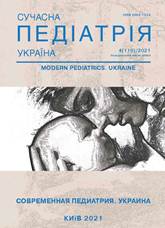The role of the student scientific circle in the training highly qualified specialists during distance learning
DOI:
https://doi.org/10.15574/SP.2021.116.82Keywords:
research work, student research group, distance learning, applicantAbstract
An important stage in the formation of the future specialist is the independent work of the applicant, in particular the involvement of the best representatives in research work. Applicants are attracted to the GDR through a student research group. The COVID-19 coronavirus pandemic and quarantine restrictions have forced almost all countries to reconsider educational strategies.
Purpose — to evaluate student research group the role of the functioning in the higher medical educational institution at the Department of Pediatric Dentistry in the training of future highly qualified specialists and the peculiarities of its work during distance learning.
Results. An important means of organizing the educational work of applicants for in-depth study of various aspects of pediatric dentistry is their research activities in independent work, in the process of which teachers are initiative and interested applicants who continue research within the student research group department, conducting research on selected topics. During distance learning IFNMU uses the site «Office 365 Cloud Services», which is accessible to all teachers and students. During the quarantine, student research group meetings are held in the format of online conferences in the Microsoft Teams program (previously created team with the type «Class» — student research group Department of Pediatric Dentistry, which added students of all courses of the Faculty of Dentistry and events in the program — in calendar according to the calendar-thematic plan student research group meetings, students and teachers are invited). Microsoft Teams is a teamroom for Office 365, which is a simpler version of learning management systems, but allows the learning team to communicate and share files. The program is convenient because it combines everything in a common work environment, which includes chat for discussion, file sharing and corporate programs. The student research group meeting was organized by video link.
Conclusions. Thus, participation in the student research group Department of Pediatric Dentistry IFNMU gives applicants the opportunity to prepare a full-fledged scientific work that enhances the educational process, promotes their professional growth, helps to combine creativity, theoretical knowledge and practical skills. In addition, it increases the level of training of future specialists and the formation of research work skills as a component of professional training of applicants and the development of scientific potential of future scientists even during distance learning.
No conflict of interest was declared by the author.
References
Borzik OA, Kaidashev IP. (2018). Competent approach in the training of a modern specialist in higher medical education. Collection of abstracts of scientific and practical conference with international participation «Topical issues of improving the quality of educational process». Ivano-Frankivsk Higher Educational Institution «IFNMU»: 77.
Denina RV. (2015). Student Scientific Circle: Improving Professional Skills. Bukovyna Medical Bulletin. 19; 3 (75): 282–284. https://doi.org/10.24061/2413-0737.XIX.3.75.2015.195
Dronov OI, Nastashenko IL, Kovalska OI, Kryuchyna EA, Skomarovsky OA, Protsyuk AV. (2013). The Role of Student Scientific Circle in the Motivation of the Professional Orientation of Medical Students. Bulletin of the Ukrainian Medical Dental Academy. 13 (1): 288–290.
Gotyur OI, Denina RV, Volyn DA, Kocherzhat OI. (2019). The role of student's research work in shaping the future specialist. Art of Medicine. 3 (11): 85–88.
Kocherga ZR, Nedostup IP, Pavlikivska BM, Gan RZ, Lotovskaya TV et al. (2019). Оrganization of work of pediatric student scientific circle is an integral part of a competent approach in the preparation of future highly qualified specialists. Bukovyna Medical Bulletin. 23; 3 (91): 150–155. https://doi.org/10.24061/2413-0737.XXIII.3.91.2019.77
Korbut OG. (2021). Distance learning: models, technologies, prospects. URL: http://confesp.fl.kpi.ua/ru/node/1123.
Kucherenko N. (2018). Distance learning as a challenge of modern university education: philosophical and legal dimension. Bulletin of the National University «Lviv Polytechnic». Legal sciences. 20: 34–40.
MES of Ukraine. (2000). The concept of development of distance education in Ukraine of the year: Resolution of December 20. Ministry of Education and Science of Ukraine. URL: http://www.osvita.org.ua/distance/pravo/00.html.
Skrypnyk LM. (2012). Distance medical education: modern realities and problems. Archive of clinical medicine. 2 (18): 116–118.
Trefanenko IV, Khukhlin OS. (2017). Student Science Circle as a Type of Student Research. Bulletin of the Ukrainian Medical Dental Academy. 17 (1): 278–281.
Tretyak NG, Dudchenko MO, Shaposhnik OA, Kudrya SP. (2017). The role of the student scientific society as a way in forming students' independent work. Bulletin of problems of biology and medicine. 1 (135): 232–234.
Downloads
Published
Issue
Section
License
Copyright (c) 2021 Modern Pediatrics. Ukraine

This work is licensed under a Creative Commons Attribution-NonCommercial 4.0 International License.
The policy of the Journal “MODERN PEDIATRICS. UKRAINE” is compatible with the vast majority of funders' of open access and self-archiving policies. The journal provides immediate open access route being convinced that everyone – not only scientists - can benefit from research results, and publishes articles exclusively under open access distribution, with a Creative Commons Attribution-Noncommercial 4.0 international license (СС BY-NC).
Authors transfer the copyright to the Journal “MODERN PEDIATRICS. UKRAINE” when the manuscript is accepted for publication. Authors declare that this manuscript has not been published nor is under simultaneous consideration for publication elsewhere. After publication, the articles become freely available on-line to the public.
Readers have the right to use, distribute, and reproduce articles in any medium, provided the articles and the journal are properly cited.
The use of published materials for commercial purposes is strongly prohibited.

